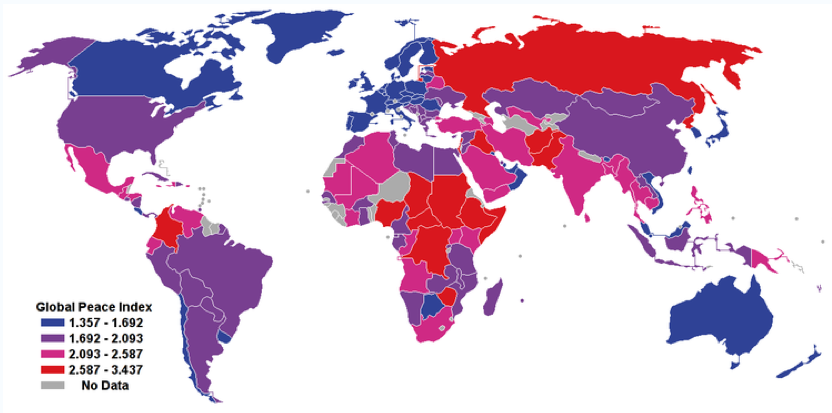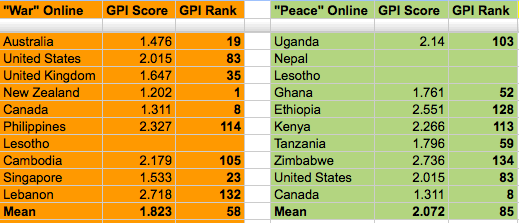Orwell’s Google Search for Peace
July 23rd, 2009 — Scott HartleyThe Global Peace Index (GPI), developed by the Institute for Economics and Peace in consultation with the Economist Intelligence Unit, measures the relative peacefulness of nations. Using both internal and external data across 24 indicators, from level of domestic violence to military expenditure, the GPI has been endorsed by policymakers and academics, from Kofi Annan and Jimmy Carter to Jeffrey Sachs.
The GPI measures the relative war and peace of nations. Internet search query data measures the extent to which people in given nations search for key terms, such as “war” and “peace.” War and Peace may be a Leo Tolstoy tome, but “War” and “Peace” online take on much more Orwellian form. While those nations deemed more “peaceful” in the GPI have a higher propensity to search for “war” on Google, less peaceful political states seem to more commonly seek online “peace.” The usual caveats apply, and conclusions drawn must consider the identity of the local Internet demographic, but the Orwellian dichotomy of War and Peace online is sufficiently provocative.
Online interest in “peace” is nationally greatest, as a proportion of domestic search volume, in Sub Saharan Africa. For example, Uganda, Lesotho, Ghana, Ethiopia, Kenya, Tanzania, and Zimbabwe have the highest domestic proportion of Google search volume on the term “peace.” Related keyword terms to qualitatively contextualize ancillary interest in the term “peace” include related “peace sign,” “peace and love,” and “world peace.”
In contrast, online interest in “war” is greatest within Western culture. For example, Western powers Australia, United States, United Kingdom, New Zealand, and Canada dominate in their domestic proportional Google search query volume on the term “war.” Related terms include “the war,” “world war,” and “civil war.” The term “Iraq war” does appear, but with 70 percent less volume than the Google query on “world war.”
States with a higher propensity to search on the term “war” ranked, on average, 58th out of the 144 nations tracked in the Global Peace Index. Though outliers such as the Philippines, Cambodia, and Lebanon did appear, New Zealand, Canada, Australia, and Singapore –arguably four of the top-25 most peaceful nations on Earth– had the greatest domestic search volume on the term “war.” Perhaps such fascination with war underscores a desire to preserve peace. Though we’re 25 years past 1984, wasn’t this the purview of George Orwell’s Ministry of Peace?
States with a higher propensity to search on the term “peace” ranked 85th, meaning that according to the GPI these states were less stable, and more war-prone. While states such as Canada appear in both lists, high search volume on the term “peace” also came from far more unstable places such as Zimbabwe, Ethiopia, Kenya, and Uganda. While “peace” could be the search query of aid workers –just as one of the top search queries in Afghanistan is for “AKO” or U.S. Army WebMail– in secluded locations such as Zimbabwe this hypothesis is more problematic.
Looking at Google query data beyond English, and across linguistic divides, can also yield very interesting conclusions. For example, by comparing War (war+guerra+Krieg+guerre+война+戦争+战争+الحرب) and Peace (peace+paz+Frieden +paix+мир+平和+和平+سلام ) one observes that Latin American nations of Bolivia, Chile, Peru, Mexico, Puerto Rico, Dominican Republic, and Colombia have high search volume on “guerra.” Whereas there is focus on war in Latin America, there is broad focus on peace across the former Soviet Union. For example, the highest relative volume of search on peace comes from the Russian Federation, Belarus, and Ukraine.
Despite Orwellian contrasts in GPI classification and online action, data across cities shows greater signs of hope. Worldwide, “peace” has greatest proportional volume in Washington, New York City, Chicago, Los Angeles, Toronto, Atlanta, San Francisco, Sydney, and London. While perhaps broad online interest in “war” permeates Western society, an online demos from regions with significant political and economic influence point to an online desire for “peace.” Perhaps the search queries of tomorrow won’t be in Newspeak afterall.









 Click Here
Click Here
July 23rd, 2009 at 5:52 pm
Fascinating. I wonder how Israel/Palestine ranked here…
July 24th, 2009 at 8:40 am
Could you elaborate on the impact of language, please. Can conclusions be drawn from what people in non-English speaking countries search for when the terms are “war” and “peace” in the kings English?
July 24th, 2009 at 3:38 pm
[…] Orwell’s Google Search for Peace […]
July 26th, 2009 at 11:20 pm
[…] for “war” terms online. I likened online “war” and “peace” to Orwell, not Tolstoy. On Friday I broadened this query by looking across languages in three regions in the Middle East: […]